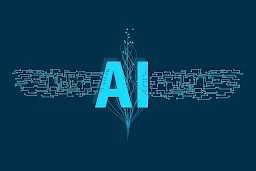Artificial Intelligence (AI) refers to the development of computer systems that can perform tasks that normally require human intelligence. These systems are designed to simulate human thought processes by enabling machines to learn, think, analyze and make decisions.
Artificial intelligence includes many subfields, including machine learning, language processing, computer vision, robotics, and more. The main terms and concepts in artificial intelligence are:
Machine Learning: This branch of artificial intelligence focuses on developing algorithms that enable machines to learn from information and improve their performance over time without any explicit instructions. Supervised learning, unsupervised learning and reinforcement learning are techniques in machine learning.
Natural Language Processing (NLP): NLP enables machines to understand, interpret and reproduce human language. It includes functions such as translation, sentiment analysis, chatbots, and speech recognition.
Computer Vision: Computer vision allows machines to interpret and understand information contained in images or videos. Applications include object recognition, image classification, facial recognition, and autonomous vehicles.
Expert Systems: These AI systems are designed to mimic the decision-making abilities of a human expert in a particular domain. They use knowledge bases and rules to solve complex problems.
Neural Networks: Inspired by the human brain, neural networks are a fundamental component of many AI systems. They consist of interconnected nodes (neurons) that process and analyze information, allowing for pattern recognition and complex decision-making.
AI technologies have permeated numerous industries and domains, bringing about significant advancements and transformations:
Healthcare: AI assists in medical diagnosis, drug discovery, personalized treatment plans, and the analysis of medical images, improving patient care and outcomes.
Finance: AI is used for fraud detection, algorithmic trading, credit scoring, and personalized financial services, enhancing accuracy and efficiency in financial processes.
Retail: AI powers recommendation systems, inventory management, customer service chatbots, and personalized marketing, creating more tailored and engaging shopping experiences.
Manufacturing: AI-driven robotics and automation optimize production processes, predictive maintenance, quality control, and supply chain management.
Autonomous Vehicles: AI is crucial in developing self-driving cars and other autonomous systems by enabling real-time decision-making based on sensor inputs and environmental data.
Ethical considerations, such as bias in AI algorithms, data privacy, job displacement, and the responsible use of AI, are important discussions as AI technologies continue to advance.
Artificial Intelligence in Revolutionizing SEO
The field of AI is continually evolving, with ongoing research and development pushing the boundaries of what machines can achieve. As AI becomes more integrated into our daily lives, its potential to solve complex problems and improve efficiency across various sectors continues to expand.
Artificial Intelligence (AI) has emerged as a groundbreaking force in the realm of Search Engine Optimization (SEO). Its impact is not just significant; it's transformative. As we navigate the intricate landscape of digital marketing, the marriage between AI and SEO stands out as a beacon of innovation and efficiency.
Understanding AI's Influence on SEO Strategies
AI-Powered Algorithms: A Game Changer
The crux of AI's impact on SEO lies in its ability to refine algorithms. Search engines like Google constantly evolve, and AI plays a pivotal role in this evolution. It enables search engines to comprehend, assess, and rank content based on a multitude of factors, far beyond simple keyword matching.
Content Optimization and Personalization
AI-driven tools are redefining content optimization by understanding user intent. Through Natural Language Processing (NLP), AI parses through massive datasets to comprehend user queries, allowing for the creation of tailored, relevant content. This not only enhances user experience but also elevates the potential for higher rankings.
Predictive Analysis and Keywords
AI empowers SEO professionals with predictive analytics. It aids in identifying trending keywords, user search patterns, and content preferences. By leveraging this data, content creators can strategically integrate relevant keywords, enhancing visibility and engagement.
AI's Impact on User Experience and Engagement
Enhanced User Experience
AI algorithms contribute to enhancing user experience by curating personalized content recommendations, thereby keeping visitors engaged and reducing bounce rates. Understanding user behavior patterns helps in serving content that resonates, increasing the likelihood of conversions.
Voice Search Optimization
The surge in voice-activated searches, thanks to AI-driven technologies like Siri and Alexa, has reshaped SEO strategies. Understanding and optimizing for conversational queries have become imperative. AI assists in decoding these queries, enabling businesses to adapt their content for voice search.
AI-Powered Chatbots and Customer Interaction
Chatbots, backed by AI, have revolutionized customer interactions. These intelligent bots can provide instant support, answer queries, and guide users seamlessly. This not only enriches user experience but also ensures round-the-clock assistance, boosting customer satisfaction.
Future Trends: AI's Evolution in SEO
AI-Driven SERP Features
As search engines evolve, so do SERP features. AI's role in understanding and adapting to these changes is crucial. Rich snippets, knowledge graphs, and other features that enhance user experience are areas where AI will continually play a pivotal role.
AI-Integrated SEO Tools
The integration of AI into SEO tools is an ongoing trend. From comprehensive analytics platforms to content optimization tools, AI-powered solutions are becoming indispensable for marketers. These tools offer data-driven insights, making decision-making more precise and effective.
AI in Hyper-Personalization
The future of SEO lies in hyper-personalization. AI's ability to analyze vast amounts of data empowers businesses to craft highly personalized content and experiences for their audience. This level of customization fosters deeper connections and brand loyalty.
The Holistic Impact: AI and SEO Synergy
In conclusion, the integration of AI in SEO marks a paradigm shift. It's not merely an enhancement but a revolution. The synergy between AI's capabilities and SEO strategies transcends conventional practices, ushering in an era of unparalleled precision, personalization, and user-centricity.
AI's role in SEO is not a standalone feature but an integral part of a holistic digital marketing approach. Embracing AI-powered strategies is not just a choice but a necessity for businesses aiming to thrive in the dynamic digital landscape.








No comments:
Post a Comment